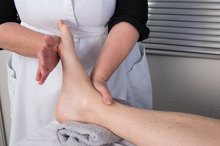Health Problems Caused by Living on Concrete Floors
Concrete floors have long been used in industrial buildings, and recently they have become popular in residential apartments and homes, too. But while concrete floors are in vogue, people who live on them can suffer from a number of health problems resulting from exposure to concrete and the lack of shock absorbency they provide. These health problems range from mild to severe and can have an impact that lasts for years. Concrete floors can even cause permanent damage to muscles and cause long-lasting pain.
If you are experiencing serious medical symptoms, seek emergency treatment immediately.
Foot Discomfort
The lack of shock absorbency in concrete flooring affects feet first, causing the soles and heels to ache. Feet take the brunt of the hard impact, as the muscles in the feet absorb the impact to protect the legs, back and rest of the body. Muscles can become sore, and over time, bones may even weaken as a result, leading to susceptibility to fracture.
Lower-Leg Pain
Rehab Exercises for Stress Fractures From Running
Learn More
People who live for long periods of time on concrete floors may develop lower-leg pain as the feet fail to absorb the full shock of concrete to the joints. The muscles in the calves can become sore as they endure more impact than usual from the hard concrete, and knees may begin to ache. Over time, the joints in the knees can become permanently damaged and arthritis may develop.
Hip Degeneration
Constantly walking on concrete floors is extremely hard on hip sockets. The hard landing on the concrete jars the joints in the hips, causing long-term damage such as arthritis or degeneration of the hip bone, and may necessitate hip-replacement surgery.
Lower-Back Pain
Signs & Symptoms of a Torn Tendon in the Foot
Learn More
Lower-back pain may develop, too, as the hard impact from each step radiates up the calves and through the thighs to the lower back. The back is usually the last part of the body to be affected, as the feet, calves and hips have softened the blow from the concrete floors. Permanent damage does not usually occur, and most people will only experience mild lower-back pain as a result of living on concrete floors.
Skin Irritation
Concrete floors are usually covered with carpet, but they are occasionally left uncovered, or there may be spots where the carpeting begins to wear away. This can become a health issue because frequent contact with cement residue can cause skin irritation---exacerbated when people walk on the floors barefoot, which can cause rashes or irritation on the soles of the feet.
Related Articles
Writer Bio
Chelsea Day started writing professionally in 2005 and has been featured in publications such as "Beverly Hills 90210" and "The Travel Magazine." She holds a Bachelor of Arts in political science from University of California, Los Angeles and runs the popular lifestyle blog Someday I'll Learn.








